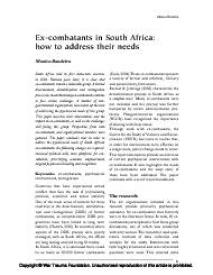Ex-combatants in South Africa: how to address their needs
South Africa held its first democratic elections in 1994. Fourteen years later, it is clear that ex-combatants remain a vulnerable group. A limited disarmament, demobilization and reintegration process has meant that many ex-combatants continue to face serious challenges. A number of nongovernmental organizations have taken up the task of addressing the psychosocial needs of this group. This paper describes their interventions and the impact on ex-combatants, as well as the challenges still facing this group. Perspectives from both ex-combatants and organizational members were gathered. The paper concludes that in order to address the psychosocial needs of South African ex-combatants the following changes are required: increased political will, more platforms for consultation, prioritizing economic empowerment, targeted psychosocial healing and recognition.
Geachte bezoeker,
De informatie die u nu opvraagt, kan door psychotraumanet niet aan u worden getoond. Dit kan verschillende redenen hebben,
waarvan (bescherming van het) auteursrecht de meeste voorkomende is. Wanneer het mogelijk is om u door te verwijzen naar de bron
van deze informatie, dan ziet u hier onder een link naar die plek.
Als er geen link staat, kunt u contact opnemen met de bibliotheek,
die u verder op weg kan helpen.
Met vriendelijke groet,
Het psychotraumanet-team.
Reference:
Monica Bandeira | 2009
In: Intervention: the international journal of mental health, psychosocial work and counselling in areas of armed conflict, ISSN 1571-8883 | 7 | 1 | 61-66
http://www.interventionjournal.com/sites/default/files/7.1%20Bandeira.pdf
In: Intervention: the international journal of mental health, psychosocial work and counselling in areas of armed conflict, ISSN 1571-8883 | 7 | 1 | 61-66
http://www.interventionjournal.com/sites/default/files/7.1%20Bandeira.pdf


